Newborn Leg Shaking: Should You Be Worried?
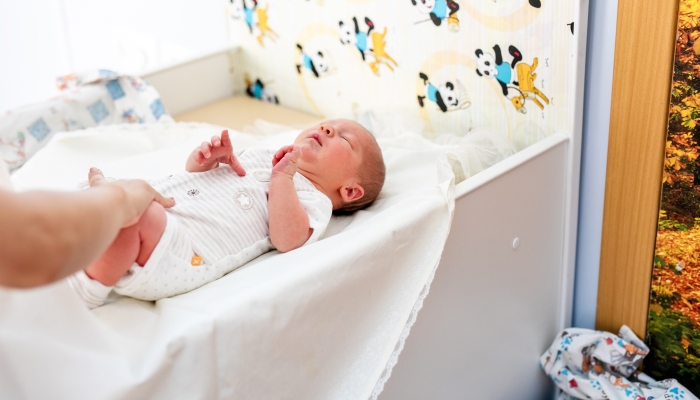
- Newborn leg shaking is common while babies are falling asleep.
- Continuous leg shaking or involuntary movements may be caused by seizures.
- Babies with leg shaking caused by nocturnal myoclonus usually grow out of their muscle jerking.
Parents of newborns have so much to worry about. Even if you’ve read every parenting book and gotten plenty of advice from friends and family, it can be scary to bring a newborn baby home.
One thing you may notice as a new parent is that your baby’s legs shake for a few seconds and then stop. It can be hard to tell whether these muscle movements are a normal part of infant development or a sign of a serious problem.
Mild newborn leg shaking is not a reason to be concerned, but severe or prolonged shaking may indicate a nervous system problem. If you notice your baby’s leg shaking, record the length of the shaking, if anything seems to make it start or stop, and any other symptoms your baby has during the shaking episode.
Is It Normal for a Newborn’s Leg to Shake?
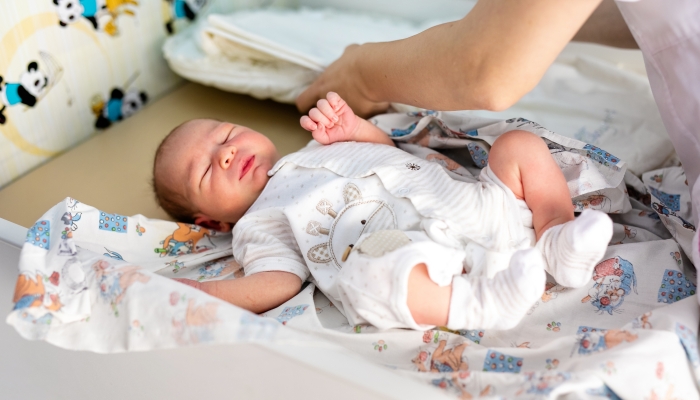
Mild leg shaking is considered normal in newborn babies, especially while they sleep. These tremors should subside as their nervous system develops and are usually gone by the time a baby is 3 months old.
According to research by Huntsman, Lowry, and Sankaran published in the Journal of Paediatrics & Child Health11. Huntsman, R. J., Lowry, N. J., & Sankaran, K.. Nonepileptic motor phenomena in the neonate. Paediatrics & Child Health. 2008;13(8), 680–684. https://doi.org/10.1093/pch/13.8.680, up to two-thirds of infants under three days old will experience some kind of fine tremor. These tremors in the arms and legs may be caused by an underdeveloped nervous system or by high levels of catecholamines present in newborn blood.
What Are the Common Causes of Leg Shaking in Newborns?
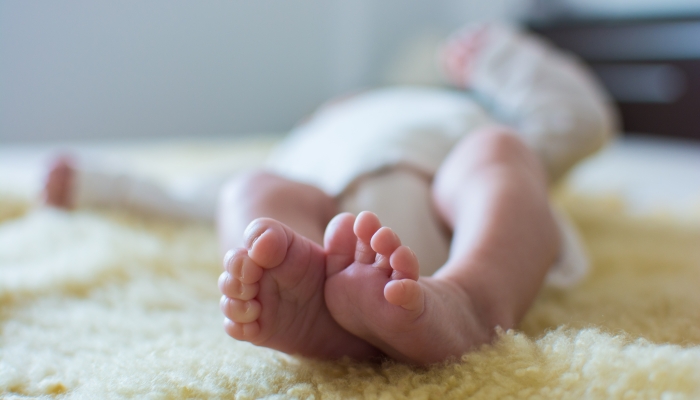
Leg shaking in newborns may be perfectly normal or it may signal a serious problem.
Startle Reflex
Babies are born with specific newborn reflexes that are not present in older children or adults. One of the reflexes normally present in babies is called the Moro reflex, also called the startle reflex. The Moro reflex is a sudden movement of the arms and legs in response to loud noises.
The startle reflex is a quick movement that only lasts a moment or two. It usually involves both the arms and legs.
Sleep Myoclonus
The American Academy of Pediatrics22. Maurer, V. O., Rizzi, M., Bianchetti, M. G., & Ramelli, G. P.. Benign neonatal sleep myoclonus: A review of the literature. Pediatrics. 2010;125(4), e919–e924. https://doi.org/10.1542/peds.2009-1839 describes benign neonatal sleep myoclonus as a condition where infants have rhythmic jerking movements in their sleep. With sleep myoclonus, your baby’s leg or other body part will stop shaking when they wake up. Babies often move erratically or grunt in their sleep.
These jerking movements are caused by an immature nervous system. They are completely harmless and most babies outgrow the benign condition by the time they are three months old.
Caffeinated Beverages
Babies are very sensitive to caffeine. Mothers who are breastfeeding their little babies should pay attention to how much caffeine they are drinking each day. Irritability and shaking caused by stimulants like coffee or soda are easily treated by limiting caffeine before breastfeeding.
Low Blood Sugar
All humans need glucose in their blood to survive. Unfortunately, some babies are born with low blood sugar. Newborns with low blood sugar can have symptoms like shakiness, low temperature, lack of energy, and even seizures.
Experts at Stanford Medicine33. Hypoglycemia in a Newborn Baby. Stanford Medicine Children’s Health. https://www.stanfordchildrens.org/en/topic/default?id=hypoglycemia-in-the-newborn-90-P01961 explain that low blood sugar, also called hypoglycemia, is more common in babies whose mothers are diagnosed with diabetes, are born prematurely, or who have high birth weight.
Infant Seizures
One of the scariest things to watch is a baby shaking while having a seizure. Seizures are not common in infants, but they do happen. A seizure can cause the entire body to shake, or just one muscle group like an arm or a leg.
Newborn seizures can last a few seconds to a few minutes. They can be caused by low blood sugar, neurological conditions, or genetic disorders. Frequent seizures are a serious condition that requires medical attention and help from a healthcare provider.
If you notice that your baby is shaking, loses consciousness, or has other concerning symptoms, seek medical attention right away.
What to Do If Your Newborn’s Leg Is Shaking
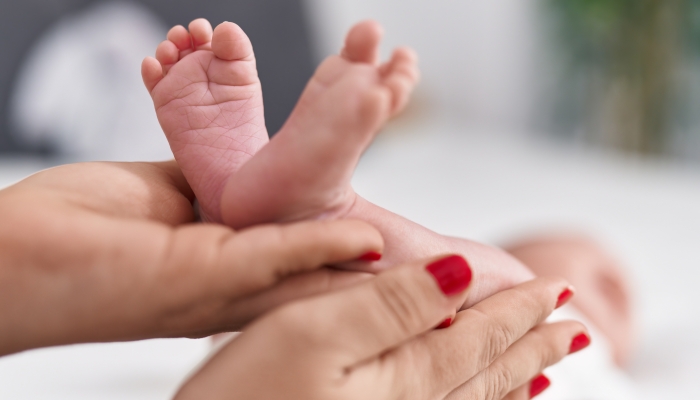
Most babies grow out of leg shakes and jerking movements as they get older. If your baby’s leg shakes only while they’re asleep and experiences only mild shaking, you can help them by gently holding their body and letting the tremors pass.
If your baby is shaking uncontrollably, stops breathing, seems distressed, or has a noticeable change in their behavior during an episode of tremors, take them to see a medical professional right away.
Prolonged seizures or frequent seizures can prevent oxygen from getting to the brain and may eventually lead to brain damage. It’s crucial that you seek treatment for newborns’ seizures right away.
If your baby’s legs are shaking, you can:
Let them sleep.
You do not need to wake a sleeping baby if they appear comfortable and safe. Keeping your newborn in a swaddle may help them sleep more peacefully.
Check their breathing.
Make sure that your baby is breathing normally if they are shaking.
Give them a pacifier.
Normal newborn shakiness or jitteriness should go away with sucking movements. If your child continues to shake after sucking on a pacifier, bottle, or breastfeeding, you may need to investigate further.
Start a timer.
Timing your baby’s shaking can help your pediatrician determine whether or not treatment is needed.
Look for other symptoms.
Notice if your baby seems uncomfortable, what other parts of their body are shaking, or whether they are able to follow the sound of your voice while shaking.
How Long Does Newborn Leg Shaking Last?
Most newborns outgrow their leg shaking by the time they are three months old. Many newborns cause their new parents anxiety with their strange movements, noises, and occasional tremors. As your child grows, their movements will become more coordinated and the shaking could stop.
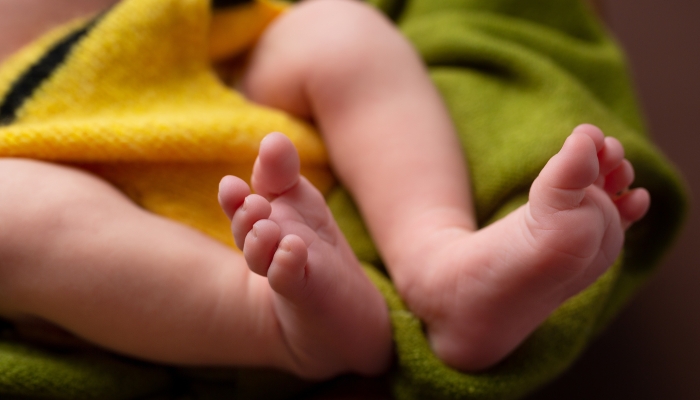
When Should You Worry About Your Newborn’s Leg Shaking?
If your baby’s leg shaking is accompanied by the following symptoms, seek medical care right away:
- Loss of consciousness
- Crying out or distress
- Difficulty breathing
- Noticeable change in behavior or focus
- Color changing to extremely pale or blue
- Shaking that lasts several minutes or longer
FAQs
How can I keep track of the frequency and duration of my baby’s leg-shaking episodes?
Using a cell phone timer is usually the easiest way to track the frequency and duration of leg-shaking episodes. Since most people keep their phones with them at all times, it’s easy to start the timer right away. Keep a journal with a recording of all episodes and bring it with you to your next pediatrician appointment.
How can I manage my own anxiety or concerns as a parent when my baby experiences leg shaking?
Watching your baby shaking can be a scary experience for both new parents and seasoned parents. Remember that leg shaking alone is not a reason for immediate concern. Many newborn babies experience leg shaking, and they grow out of it without any problems.
Monitor your baby’s breathing and color while they shake. If they stop breathing or start to turn blue, call emergency services right away.
How can I ensure a safe environment for my baby if they have leg-shaking episodes?
Newborn babies should not sleep with any padding, pillows, or blankets in their crib. Instead of using cushions to keep them safe, you can swaddle your baby to help protect them from any wild movements.
If your older baby has leg-shaking episodes, try to keep them away from sharp corners in case they fall. Never place your baby on a high surface without keeping one hand in contact with them at all times.
Which healthcare professional should I consult if I’m concerned about my newborn’s leg shaking?
The first person you should speak to is your pediatrician. They will be able to discuss your concerns and look over any records you have kept of your baby’s leg shaking episodes. If your pediatrician is concerned about a more serious problem, they may refer you to a pediatric neurologist.
Could my newborn be having a nightmare if they are shaking in their sleep?
You may worry that your newborn’s nighttime shaking is caused by nightmares. However, research shows that newborns do not have the complex thinking abilities required for dreaming. Most children do not begin to dream until the age of six years old.
References
- Huntsman, R. J., Lowry, N. J., & Sankaran, K. (2008). Nonepileptic motor phenomena in the neonate. Paediatrics & Child Health, 13(8), 680–684. https://doi.org/10.1093/pch/13.8.680
- Maurer, V. O., Rizzi, M., Bianchetti, M. G., & Ramelli, G. P. (2010). Benign neonatal sleep myoclonus: A review of the literature. Pediatrics, 125(4), e919–e924. https://doi.org/10.1542/peds.2009-1839
- Hypoglycemia in a Newborn Baby. Stanford Medicine Children’s Health. (n.d.). https://www.stanfordchildrens.org/en/topic/default?id=hypoglycemia-in-the-newborn-90-P01961
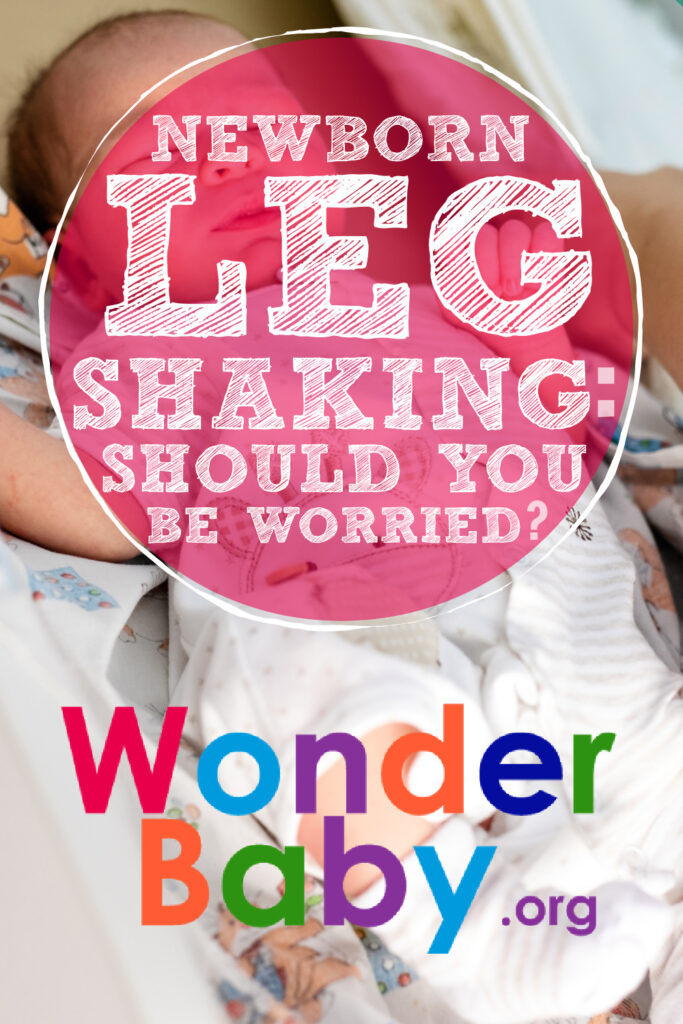
The information WonderBaby provides is not intended to be, and does not constitute, medical or other health advice or diagnosis and should not be used as such. Always consult with a qualified medical professional about your specific circumstances.
Related Posts

Eye Conditions and Syndromes, Visual Impairment
Neuralink Announces Plans to Restore Sight to the Blind with Brain Chip
Elon Musk’s company Neuralink has announced plans to begin human trials of its new “Blindsight” brain chip by the end of 2025.

Health & Nutrition
Can Baby Skin Care Products Expire?
Is that forgotten tube of diaper rash cream still safe to use? Learn more about the expiration dates of popular skin care products for infants.

Health & Nutrition
Boosting Immunity in Kids: 3 Tips for a Healthy Winter
Parents can help boost their kids’ immunity during cold and flu season by maintaining healthy eating, sleeping, and exercising habits in the winter.